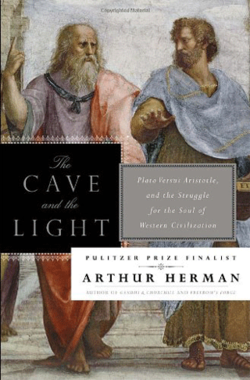 The Cave and the Light: Plato Versus Aristotle, and the Struggle for the Soul of Western Civilization
The Cave and the Light: Plato Versus Aristotle, and the Struggle for the Soul of Western Civilization
I am a student of history, having read much of the main classical Greek and Roman translated history sources. However, my study into the area of philosophy has been tertiary. This book provided not only an architectural outline of the Platonic and Aristotelian philosophical structures but a progressive history of their changes, branches, impacts and major figures on both sides. The book is written with warm and engaging tone while being crisp and insightful in its points.
This is a great book for anyone who wants a thorough history of western philosophy for a layman. It doesn't require college philosophy course training to follow the arguments , ideas or people. It is smartly self-contained and accessible. The best book I have read in the last five years.
The author's primary insight is, itself, a triumph of western thinking- that the world's most proliferated civilization has become so by the dynamism of its two polarities of philosophical inquiry. The tension of that dynamism has become the powerful tool for self-critique and self-correction that is built into the 2500 year-old scaffolding of western thought. This insight alone makes this book not only worthwhile, but essential to virtually everyone interested in their society and participation in it.
The author, Arthur Herman, is scant ever guilty of injecting personal prejudice into the text or it's summary findings. This makes it not only readable, but laudable.
At just over 700 pages, Herman, a Pulitzer Prize nominee, has presented the book in an affable style while staying solidly bound by scholarship and not making illogical leaps in his conclusions. He also doesn't treat the book like a thesis outline. There is no dissertation style and format here, giving the "tell them what you'll tell them, tell them, and tell them what you told them" mindless repetition. Thankfully, the scholar leans this book towards a popular audience and it reads perfectly well for the informed and uninformed reader.
The breadth of this work, the importance of the topic, the careful attention to detail, the rigorous explanation of change, and the final sterling conclusions it draws make this one of the best books I've ever read.
A brilliant work of international significance.
Amazon Link: http://amzn.to/2EfB3NV
Review by Kim Gentes